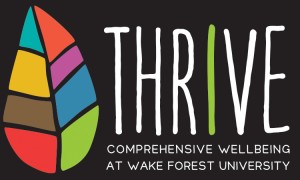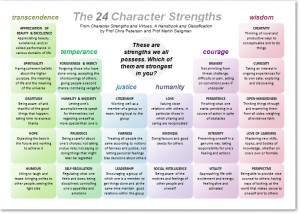Which Character Trait Is Most Predictive of Wellbeing?
 Hopefully our upperclassmen parents have already heard about Thrive, our campus efforts to promost holistic wellbeing (for all the freshmen parents, you can see the Thrive website and the 8 dimensions of wellbeing).
Hopefully our upperclassmen parents have already heard about Thrive, our campus efforts to promost holistic wellbeing (for all the freshmen parents, you can see the Thrive website and the 8 dimensions of wellbeing).
I saw a very interesting article on wellbeing over the weekend entitled “Which Character Strengths Are Most Predictive of Wellbeing,” from the Scientific American website. It bears a mention here.
 In the article, it has an infographic about 24 Character Strengths (such as love, hope, vitality, gratitude) that were grouped into 6 larger categories (transcendence, humanity, wisdom, temperance, courage and justice). The notion is that we have the capacity for all 24 traits, and that it can be helpful to identify where our strengths are (to capitalize on them) and where our weak spots are (to grow them).
In the article, it has an infographic about 24 Character Strengths (such as love, hope, vitality, gratitude) that were grouped into 6 larger categories (transcendence, humanity, wisdom, temperance, courage and justice). The notion is that we have the capacity for all 24 traits, and that it can be helpful to identify where our strengths are (to capitalize on them) and where our weak spots are (to grow them).
Taking it a step further, the author wanted to investigate these 24 traits and answer the question “Which character strengths are most predictive of well-being? ”
Disclaimer: the article might read best to the statistics wonks among us. I’ll skip the step by step of his regression analysis (though you can read it all online) and cut to the chase:
“Out of all 24 character strengths, the only significant independent positive predictors of well-being were gratitude and love of learning.** Note that love, honesty, and humor were very close to being statistically significant independent positive predictors of well-being….[but] The single best predictor of well-being was gratitude.”
Let’s think about this in terms of college students for a moment. One of the significant independent positive predictors of well-being is love of learning. In theory all your students have that, or they would not be going to college. Students may feel like learning is their ‘job’ while in college, and they want outcomes like good grades and positive comments on papers and projects, etc. In other words – they expect to learn and are focused on that, so love of learning is perhaps a given.
But are students equally focused on gratitude? If gratitude is one of the biggest predictors of well-being, how can we help students realize its importance and practice it in their daily lives?
There is no ‘grade’ in gratitude. It doesn’t go on your transcript or your job application or your resume. But it might be one of the more – most? – vital things your students can learn in college.
Gratitude can show itself in countless ways – a ‘thank you’ to another person, an internal reflection on how lucky one is to have good health/cherished friends/family/a good partner [insert anything that is important to you], entries into a ‘gratitude journal,’ where you list good things that happen (and can go back to those pages in times when you need a boost).
 I would argue that gratitude is a habit – not unlike exercise, or eating right, or getting enough sleep. Something that the more you practice, the better you get at it.
I would argue that gratitude is a habit – not unlike exercise, or eating right, or getting enough sleep. Something that the more you practice, the better you get at it.
Is it worth having a conversation about gratitude with your Deacs before school starts? Give them the gift of a gratitude journal before they leave for school (these can be a lot of fun – see the example at right that I saw online). Encourage them to try a gratitude app on their smartphones?
Food for thought on a Monday, anyway.
— by Betsy Chapman
